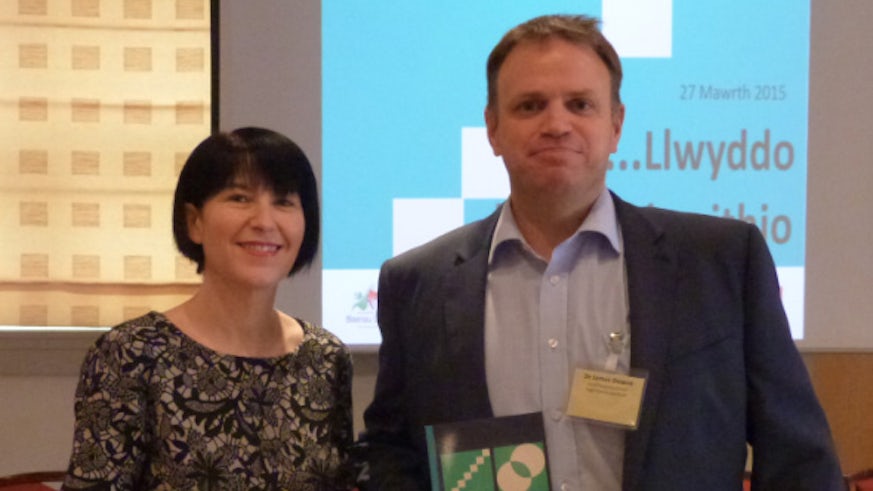Bridging the accountability gap in public services
Our research led to the development of a new handbook to enable better accountability across public services and support the development of new legislation on joint working in Wales.

New and complex forms of public service collaborations have created an accountability gap.
To plug this gap, local authorities came together to implement joined-up models of accountability.
Recognising the benefits of such approaches, researchers from Cardiff Business School sought to address the lack of clear guidance on how to deliver joint scrutiny effectively.
Their research influenced Welsh Government’s continued support of its Scrutiny Development Fund and led to a Joint Scrutiny Handbook for local governments.
This widely adopted Handbook:
- informed legislative proposals for a new system of joint working in Wales
- underpinned training delivered by the Welsh Local Government Association and the UK-wide Centre for Public Scrutiny
- enhanced local authority practice in Wales and England
A lack of accountability
Between 2000 and 2004, Professor Rachel Ashworth and Professor James Downe carried out an 'audit' of local government scrutiny under a new system for England and Wales.
While scrutiny was making a valuable contribution to policy review in some authorities, the audit revealed scrutiny was not holding executives to account effectively. Similarly, scrutiny of external organisations was a marginal activity for most authorities.
Further research raised concerns about the lack of accountability created by partnerships in the English regions.
It was clear to Professor Ashworth that increased funding, training and guidance was critical for politicians with responsibility for scrutinising large, financially significant organisations with wide-ranging remits.
In Wales, Professor Downe’s evaluation of scrutiny arrangements showed that effectiveness was driven by each council’s context and the extent to which council leaders valued scrutiny.
He found joint scrutiny was poorly developed and identified an acute need for councils to work together to generate added value by pooling their resources.
New ways of working
With research capacity building in this area, the Cardiff University team called on governments to provide adequate guidance to those delivering scrutiny to support and enable evidence-gathering processes.
In work commissioned by the Welsh Government, the researchers recommended providing a blueprint for collaborative scrutiny to help address practical challenges.
The report highlighted:
- the need for urgent attention to structures, cultures and sharing of practices
- the difficulties presented by the complexity of contemporary public services
- a lack of expertise to interrogate services on a thematic basis
- limitations in capacity required to undertake effective scrutiny in times of austerity
In 2012, they were asked to independently evaluate the effectiveness of the Welsh Government’s Scrutiny Development Fund.
While good practice across local authorities was inconsistent, the fund was providing opportunities for scrutiny teams to trial new ways of working by buddying with or shadowing colleagues from other areas and jointly commissioning better quality training to run in-house.
Their evaluation of the Scrutiny Development Fund informed Welsh Government’s decision to continue financial investment in this area and to deploy additional resource to strengthen joint scrutiny activity going forward.
A living resource
One of the projects to emerge from renewed support for the Scrutiny Development Fund was the Joint Scrutiny Handbook.
Co-designed with local government managers from three councils in Wales, the Handbook was underpinned by research from Professor Ashworth, Professor Downe and Rebecca David-Knight (formerly of the Welsh Government).
Input from all 22 scrutiny teams in Wales, as well as the Welsh Local Government Association, Welsh Government, Audit Wales, and regulatory partners ensured the Handbook was user focused with guidance on:
- selecting the right model
- designing terms of reference
- appointing scrutineers
- setting up officer support
- managing a joint scrutiny review
- co-ordinating evidence gathering
- reporting arrangements
- capturing learning points for ongoing improvements
The Handbook was widely disseminated across the public sector in Wales and England in 2015 and 2016. Designed to be a living resource to keep pace with public policy developments, a second edition followed in 2017 including new case studies.
Since publication, the Handbook informed legislative proposals in the Local Government and Elections (Wales) Act which established a new system of Corporate Joint Committees for Wales.
Crucially, it has also influenced practice through sector wide training and development.
In Wales, it has been used by councils in different ways: from prompting collaborations, to supporting the development of proposals and offering alternative options for joint scrutiny, to the use of checklists and case studies of good practice.
While in England, the Handbook has been used to improve accountability and scrutiny of Local Enterprise Partnerships and of health services.
Related news and links
Find out more about the project and related work.
Meet the team
Key contacts
Selected publications
- Ashworth, R. E. , Aulakh, S. and , 2007. Plugging the Accountability Gap? Evaluating the Effectiveness of Regional Scrutiny. Environment and Planning C Government and Policy 25 (2), pp.194-211. (10.1068/c55m)
- Ashworth, R. E. and Snape, S. 2004. An overview of scrutiny: A triumph of context over structure. Local Government Studies 30 (4), pp.538-556. (10.1080/0300393042000318987)



